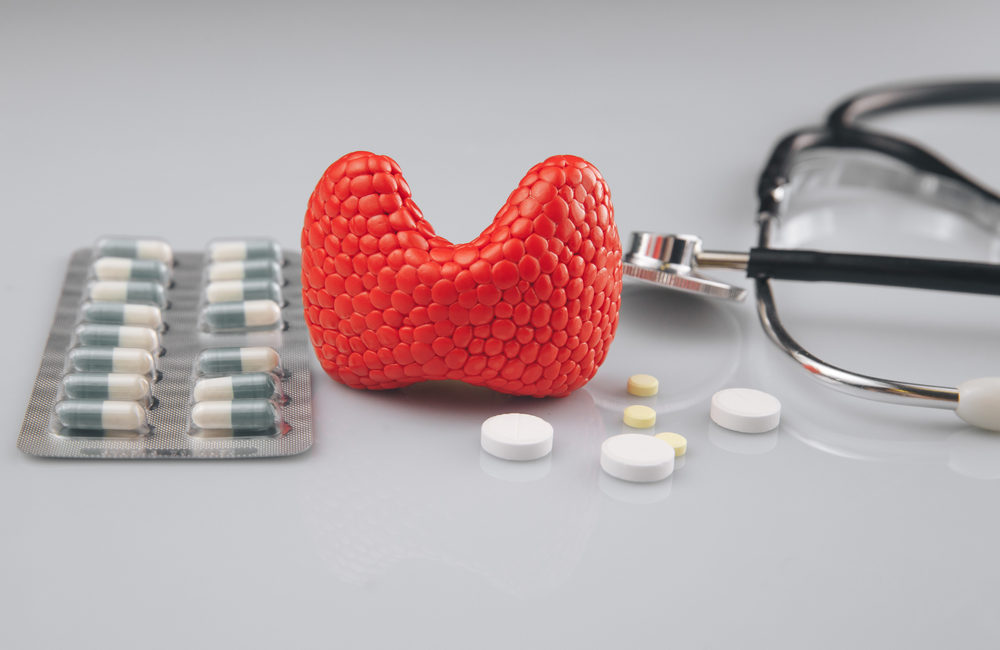The U.S. Food and Drug Administration (FDA) has announced another thyroid medication recall due to the drugs being sub potent. This FDA recall includes two lots of medication manufactured by Acella Pharmaceuticals, LLC. The Acella recall follows just weeks after RLC Labs, Inc. announced a hypothyroidism medication recall of certain lots of their products.
Both recalls stem from tests showing that the drugs are sub potent. Sub potent medications can have a significant impact on patient health.
Second Thyroid Medication Recall Information
According to the FDA Company Announcement, Acella is voluntarily recalling two lots of hypothyroid medication. Acella is recalling NP Thyroid 15 and NP Thyroid 120 tablets. Both drugs contain T3 and T4 hormones. The FDA reports that tests show the drugs may contain only 87% of the amount of T4 hormone levothyroxine indicated on the label.
The two affected lots in this thyroid medication recall were distributed to healthcare providers, pharmacies and direct accounts. They are distributed across the United States. Consumers can identify the products by the following:
NP Thyroid 15 Thyroid Tablets, USP, ¼ grain (15 mg)
- NDC – 42192-327-01
- Lot – M327E19-1
- Expiration – October, 2020
NP Thyroid 120 Thyroid Tablets, USP, 2 grain (120 mg)
- NDC – 42192-328-01
- Lot – M328F19-3
- Expiration – November, 2020
If you have NP Thyroid products but the expiration date is after December 2020, the product is not included in this current recall.
Risks Related to this Thyroid Medication Recall
Acella’s NP Thyroid medication is used by patients who have hypothyroidism, or underactive thyroid. If a patient with hypothyroidism takes medication that is sub potent, he or she may experience the return or worsening of symptoms related to hypothyroidism. The FDA warns that patients may experience:
- Fatigue
- Sensitivity to cold
- Constipation
- Dry skin
- Hair loss
- Slow heart rate
- Swelling of the thyroid gland
- Unexplained weight gain
Elderly patients, pregnant women and newborns are also susceptible to more serious injury or complications. Pregnant women with hypothyroidism may experience early miscarriage. Fetal hypothyroidism can also cause birth defects by interfering with neural and skeletal development.
Elderly patients who have a history of cardiac problems may also experience cardiac manifestations related to hypothyroidism, including palpitations, arrhythmia or cardiac pain.
The FDA reports that Acella has received four adverse events reports from consumers taking the medications in this recall.
Information about Hypothyroidism
Hypothyroidism refers to the medical condition where the thyroid gland does not product enough hormones to keep the body healthy and fully functional. When the body doesn’t have enough thyroid hormone, many processes start to slow down. The result is symptoms such as:
- You feel colder or more sensitive to cold
- You get tired easier than usual
- Your skin is drier
- You feel depressed
- You experience constipation
These symptoms are sometimes difficult to attribute to thyroid problems because they are so nonspecific. There are many medical conditions that can cause these symptoms. However, doctors can do a blood test to test for thyroid hormone levels to see if your thyroid is functioning properly.
What Causes Hypothyroidism?
There are several reasons why your thyroid may not produce enough hormone. Most often, the cause of hypothyroidism is one of the following:
- Autoimmune disease
- Surgical removal of the thyroid
- Radiation treatment
- Congenital hypothyroidism
- Damage to the pituitary gland
- Certain medications
- Too little or too much iodine
Autoimmune disease is the most common cause of hypothyroidism, but you should talk to your doctor about your symptoms and any of these possible causes.
How is Hypothyroidism Treated?
The reason that a thyroid medication recall is so significant is because replacing missing thyroid hormones is the primary mode of treatment. The T4 hormone levothyroxine is the primary ingredient in NP Thyroid and other medications used to treat hypothyroidism. Drug manufacturers use levothyroxine or synthetic versions of the T4 hormone to help patients manage symptoms.
Taking too much or too little T4 can be dangerous for patients with hypothyroidism. Too little medication can result in symptoms returning or worsening. Taking too much can cause the thyroid to become overactive, which causes additional symptoms.
What to Do if You Have a Recalled Medication
The FDA urges consumers to talk to their healthcare provider if they have one of the products listed in this thyroid medication recall. Your healthcare provider can guide you on whether you should stop taking your medication. Your healthcare provider may prescribe a different medication or a replacement prescription for NP Thyroid that is not included in the recall.
If you experience adverse events while taking Acella’s NP Thyroid, tell your healthcare provider about your symptoms and experience. The FDA also urges you to report your experience through MedWatch: The Adverse Event Reporting program. With MedWatch, you can file a report online, by mail or by fax. The report goes to the FDA, and they use the information to determine just how dangerous a drug may be.
If you experience adverse events while taking any medication or using a medical device, you may also find it helpful to contact Drug and Device Watch. Our legal team can help you understand your legal rights as a patient and consumer. Patients who suffer harm because of a dangerous or defective drug or device may be able to pursue compensation.
If you are suffering due to a dangerous, defective or recalled drug or medical device, contact us to learn more. You can contact Drug and Device Watch toll free at 1-888-458-6825. You can also contact us online using our confidential contact form.
Sources:
- https://www.fda.gov/safety/recalls-market-withdrawals-safety-alerts/acella-pharmaceuticals-llc-issues-voluntary-nationwide-recall-two-lots-np-thyroidr-thyroid-tablets
- https://www.fda.gov/safety/medwatch-fda-safety-information-and-adverse-event-reporting-program/reporting-serious-problems-fda
- https://www.thyroid.org/hypothyroidism/#:~:text=Hypothyroidism%20means%20that%20the%20thyroid,the%20thyroid%2C%20and%20radiation%20treatment.
